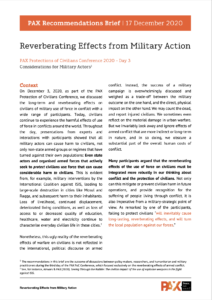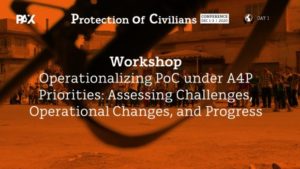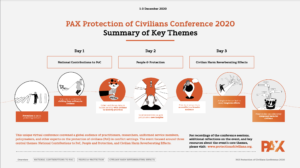Reading day 2 | People and Protection
Al Jazeera – South Sudan counts human cost of deadly cattle raids
For many in South Sudan, cattle are regarded as a symbol of wealth. But they are often stolen by rival communities in violent and sometimes deadly raids. Local organisations say more than 5,000 civilians have been killed in cattle raids since South Sudan gained its independence in 2011. Al Jazeera’s Hiba Morgan reports from Rumbek.
Saferworld – South Sudan cattle raids and small arms control
In this video, Saferworld sets out the problem of small arms proliferation in South Sudan and how we are working with the government and local partners to encourage dynamic and strategic solutions to prevent violent cattle raiding.
CIVIC – Protection Through Dialogue: How UNMISS is Linking Local Engagement with a National Peace Process in South Sudan
Center for Civilians in Conflict (CIVIC) carried out interviews in Juba and Yei between December 2019 and February 2020 to assess the implementation of UNMISS’s new program of work. This Issue Brief summarizes CIVIC’s research findings and highlights good peacekeeping practices.
Evaluation of the contribution of the UNMISS Civil Affairs Division to the reduction of local conflict in South Sudan
This evaluation report determined the relevance, efficiency and effectiveness of the activities of the Civil Affairs Division (CAD) of the United Nations Mission in South Sudan (UNMISS), and their plausible contribution to local conflict reduction in the country. Amongst the missions’ largest civilian component, CAD led the missions’ efforts to reduce conflict at the local level.
Stimson Center – Perceptions of Security Among Internally Displaced Persons in Juba, South Sudan
This brief synthesises voices of internally displaced persons seeking protection at United Nations peacekeeping operation bases in Juba, South Sudan.
Bayan Center – Iraqi Woman: Fears of a New Economic Crisis
Iraqis have always faced crises in different periods like what happened after the United Nations Security Council issued economic sanctions against Iraq in 1990, which lasted for years. They have adapted to a way of life to interact smoothly with the crisis. The situation is different now.
SIPRI – Tensions on Iraqi soil likely to overshadow anti-government protest demands
Dr O’Driscoll commentates on the significance of the continuing Iraqi protests, and asks if attention has been drawn away from the underlying issues driving these protests by the increased tensions between the US and Iran.
Ninewa Plains and Western Ninewa: Barriers to Return And Community Resilience
This report is a meta-analysis of the vast literature on Ninewa IDPs and the barriers to their return. It covers important analytical and contextual gaps with firsthand research to inform and enhance stakeholder policies.
CIVIC – ‘Let Us Be Part of It’ Community Engagement by the UN Peacekeeping Mission in South Sudan
This CIVIC report provides a look at how military, police, and civilian components of the United Nations peacekeeping operation in South Sudan (UNMISS) are engaging communities to understand and address civilian protection concerns. The report highlights the importance of UNMISS personnel conducting strategic and coordinated engagement activities and ensuring that information collected from civilians is used to inform operational decisions.
ASPR – “Don’t Take This Away From Us Again” Citizen Perceptions of Peace in South Sudan
This policy brief by the Austrian Study Centre for Peace and Conflict Resolution (ASPR) discusses the preliminary results from the first stage of research in their research project “Perceptions of Peace in South Sudan”. This research project seeks to investigate, document, and draw from policy lessons from citizen perceptions of the peace process in South Sudan.
CIVIC – “We Just Want Someone to Protect Us” Civilian Protection Challenges in Kirkuk
This policy brief analyzes the protection threats affecting civilians in Kirkuk due to the existence of ISIS cells still active in the governorate. It also assesses the response of security forces to these threats, the efforts by the Government of Iraq (GOI) and the ISF to improve security in the governorate and ensure the safety of its inhabitants, and the trust deficit between civilians and security actors.
“What If He Were Innocent?:” Insights into CIVIC’s Engagement with the Nineveh Police
This short blog provides practical insights into a CIVIC protection of civilians workshop for the Nineveh police. It illustrates how this workshop affected the particular way police officers conducted security checks.
PAX PoC team’s Human Security Survey Iraq – Dashboard
This dashboard shows the results of PAX PoC team’s Human Security Survey (HSS) in Iraq.
PAX PoC teams’s Human Security Survey Iraq – Methodology
This document details the methodology developed by PAX’s PoC team for conducting representative surveys on civilian security perceptions and experiences in Iraq.
PAX PoC team’s Human Security Survey Iraq – Publications
All publications related to PAX PoC’s HSS Iraq.
PAX PoC team’s Human Security Survey South Sudan – Dashboard
This dashboard shows the results of PAX PoC team’s Human Security Survey (HSS) in South Sudan.
PAX PoC team’s Human Security Survey South Sudan – Methodology
This document details the methodology developed by PAX’s PoC team for conducting representative surveys on civilian security perceptions and experiences in South Sudan.
PAX PoC team’s Human Security Survey South Sudan – Publications
All publications related to PAX PoC’s HSS South Sudan.
PAX PoC team’s Human Security Survey – Stories
Stories of the PAX PoC’s HSS.
The opportunity for local peacebuilding interventions: the case of Kirkuk
Dr O’Driscoll’s essay highlights core areas where there is an opportunity for local peacebuilding interventions that will affect a real change in the everyday lives of Kirkukis.
IOM Iraq – Perceptions of Police, Security and Governance in Iraq
This report by IOM Iraq and Yale Law School’s Center for Global Legal Challenges compares survey findings evaluating civilians’ attitudes and behaviors towards providers of security and justice; their perceptions of the legitimacy of the Iraqi government; police officers’ attitudes and behaviors toward civilians; and the prevalence of crime and violence.
National Democratic Institute – Focus Group Report: Iraqi Citizens Continue to Demand More Responsive Governance
This report details a qualitative public opinion research conducted by the NDI with funding from the Government of Canada. Results show that the most pressing need among Iraqi citizens in provinces formerly occupied by the Islamic State of Iraq and Syria (ISIS) is finding job opportunities and improving their economic situation. This is seen as a precondition for satisfying other necessities which the government is failing to provide, mainly water and electricity.


